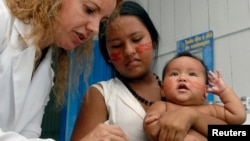Brazil has cut the number of doses for vaccinations given by the public health service to counter human papillomavirus (HPV) and pneumonia, as Latin America's largest economy looks to reduce health costs in the midst of a deep recession.
In a statement late Tuesday, the Health Ministry said the changes were "routine" and would not alter the efficacy of the vaccinations, but it also noted the cost of the national program had risen 140 percent over the past five years.
In 2015, the cost of distributing nearly 300 million immunobiologicals, such as vaccines, totaled 2.9 billion reais ($720 million), the ministry said.
Sources familiar with the matter said Brazil has been reducing imports of vaccines over the past year, resulting in diminishing stocks.
The ministry did not say how much money would be saved by reducing the number of doses.
Brazil's health system has been hit hard by falling government revenues. The state of Rio de Janeiro declared a state of emergency in December after it ran out of money to pay for equipment, supplies and salaries.
Revenues for the state, which is Brazil's main oil hub, have been particularly hard hit by a slump in international petroleum prices.
The Health Ministry said the doses for vaccination against HPV, a group of sexually transmitted viruses that can cause cancer, will be reduced to two from three.
The doses for vaccines given to babies to fend off pneumonia will be cut to two, with a booster, from three and a booster.





